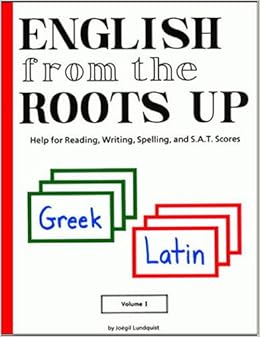My love for grammar was late blooming. Truth be told, I didn't see much use in all those funky bracket looking things that had words dangling from various and sundry locations. Diagramming was a bore. It all magically came together, though, when I enrolled in an honor's Latin course at the University of Kansas. Because it's an inflected language, suddenly all those parts of speech had supreme significance. Objects of the preposition? Genetive case? Verb tense? It all mattered, and I thanked God I had paid attention to all that grammar mumbo jumbo in grade school.
That was a lifetime ago, but I carried my strengthened appreciation for grammar forward in my homeschooling and cheerfully doled out sentences filled with complex diagramming. The kids learned all about concepts like predicate nominatives and predicate adjectives, main clauses, verbals, and prepositions. They groaned. Repeatedly. But now, my middle guy is starting to see what all the hubbub is all about. You see, he enrolled in Florida Virtual's Latin I!
I didn't expect this, honestly. My oldest wanted to study German, and we had a dickens of a time finding a program that would be accepted by the schools he wanted to apply to for college. Eventually we found Oklahoma State's German Online. It was a perfect solution, but I decided to encourage my younger boy to choose a language that would have Florida Virtual support to make it easier to use for college applications. I thought his only choices would be French and Spanish. I still had nightmares from the 2.5 weeks I spent in French back in my university days, so his options seemed limited to only Spanish. We logged on to select the course and were surprised to discover Latin was also available.
I put the question to him, and he immediately asked to study Latin. When I asked him why, he asserted that it would help him with vocabulary building for the SAT. He's right. It will. So we duly clicked the selection and he's off and running. It's not an easy class, but we have found that making flashcards helps immensely. We started a set for him over at Quizlet. It has also been helpful that the course focuses on the Classical pronunciation of the vocabulary, so I can help him with it. I would be lost in the Ecclesiastical pronunciations.
While my middle guy is working hard at Latin I, my youngest is also getting her fair exposure. I've incorporated English From the Roots Up in the essay and literature class I'm teaching at co-op, and she is really enjoying all the root study. While it's not a formal Latin or Greek course, it is packed full with wonderful roots and derivatives based on those roots. We are tackling three roots a week, and by the end of the year will have covered one hundred. I taught this to my oldest when he was the ripe old age of eight, but it works for all ages; you just have to adjust it according to a child's level.
It's refreshing to get back to the study of Latin. It's a language that I have grown to appreciate, and I know that students who study it faithfully have much larger vocabularies. If your child needs to study a foreign language in order to be able to enter a certain college or university, don't shy away from it. It can be a lot of fun to learn and will bless you with better comprehension and an appreciation for the logic of it. Go for it!

No comments:
Post a Comment